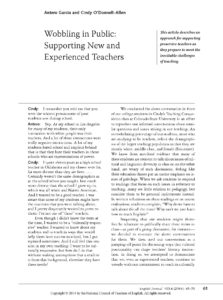Excerpt
How, for instance, does Antero address concerns about cultural positionality while preparing a mostly white, female, middle-class population when he is often the only person of color in the room? How does Cindy make claims about “what diverse students need” without essentializing various student populations or lumping them together as a homogeneous group? Moreover, how do the few students of color who are studying to be pre-service teachers in our classes participate in these conversations without taking on the responsibility of “representing” others who share their particular backgrounds?
In this article we highlight how considering questions such as these, especially from the perspectives of career teachers, can help support communities of teachers still in the developmental stages of their practice. In doing so, we (1) challenge preexisting stereotypes of “master” and “novice” teachers; (2) offer a new framework for identifying and working through challenging areas of one’s teaching that we call Pose/Wobble/Flow; and (3) underscore how the practice of public reflection is sorely needed in today’s teacher education programs.


